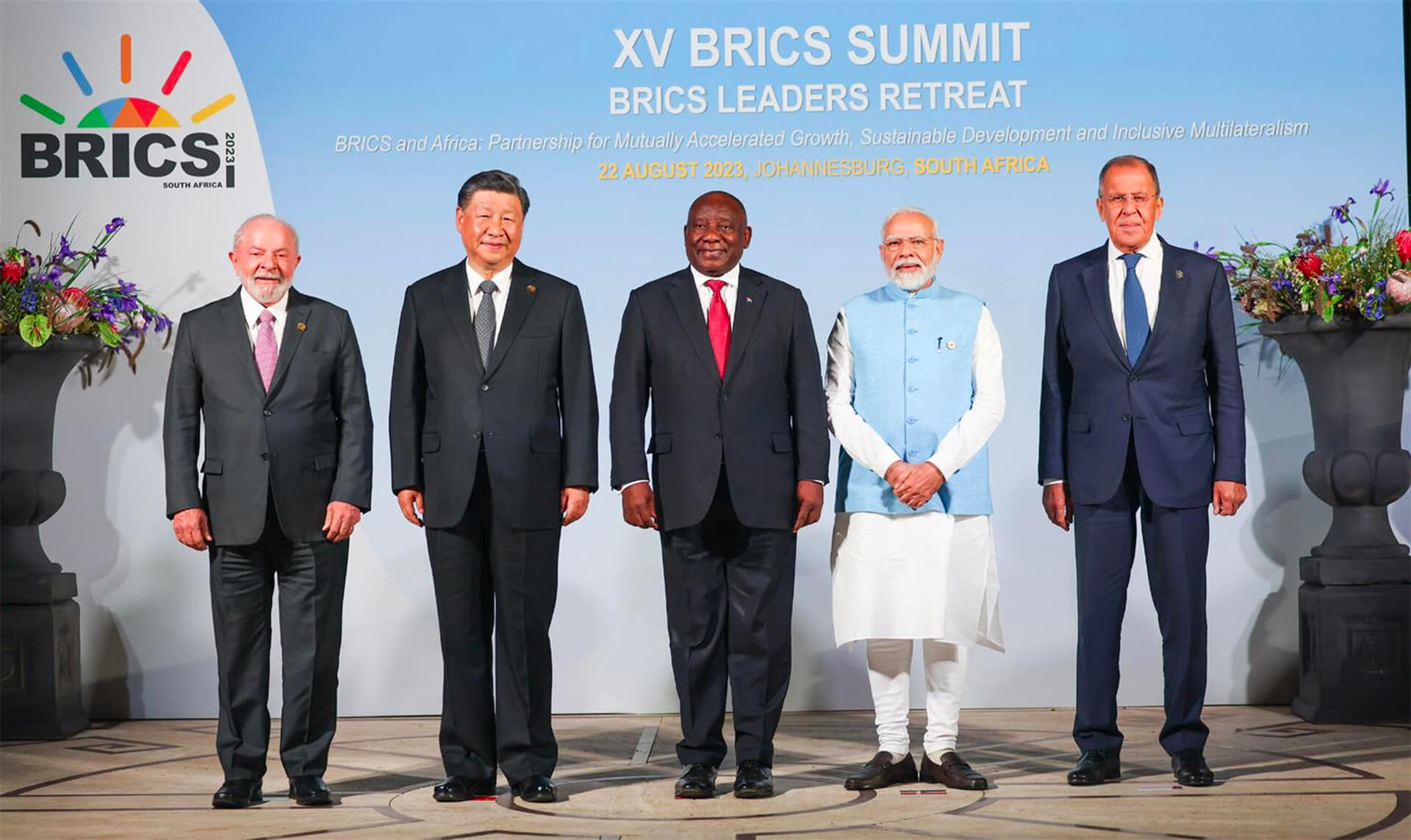The future for most of the BRIC countries is not – as Rihanna so eloquently put it – “shining bright like a diamond.” If I had to choose between Brazil, Russia, India and China, my money is on India outlasting the others.
Most of you know where I stand on China, and its collapse is inevitable. Russia has been shooting itself in the foot for ages, and its recent war on Ukraine is only going to bring them closer to that final bell. Brazil has a better demographic outlook than China and Russia, but geographic constraints and dependence on China will catch up to the Brazilians sooner or later.
Thanks to a stable demographic picture and growing need for self-sufficiency, India stands out as the most resilient. As long as these factors remain, India is set to do very well…even if they have to do everything on their own.
Here at Zeihan on Geopolitics, our chosen charity partner is MedShare. They provide emergency medical services to communities in need, with a very heavy emphasis on locations facing acute crises. Medshare operates right in the thick of it, so we can be sure that every cent of our donation is not simply going directly to where help is needed most, but our donations serve as a force multiplier for a system already in existence.
For those who would like to donate directly to MedShare or to learn more about their efforts, you can click this link.
Transcript
Hey, everybody. Peter Zeihan here. Coming to you from Maine. That’s New Hampshire over there. Because, you know, what? You state. Today I’m taking an entry from the Ask Peter Forum, specifically of the original BRIC countries: which one do I think is going to do the best and stand the test of time and why? And it’s always… there’s no boat.
The waves can’t be good anyway. Well, let’s do a process of elimination. First and foremost, China — let’s dispose of that. Demographically, China is facing national dissolution. The birth rate has now been lower than the United States since the early 1990s, and it’s already at a point where it has about the same number of people over age 50 as under.
So, we are looking at ethnic dissolution of the Han ethnicity before the end of this century. To think that there can be a country that comes out of a place with no people? No. It’s just a question of how China dies. And that’s before you consider that this is a country that imports almost all of its energy, imports almost all the components that allow it to grow its own food, imports almost all of its raw materials, and is completely dependent upon exports to the wider world in order to absorb all of its manufacturing capacity.
It is the country on the planet that is most dependent in absolute terms on globalization, and that means on the U.S. military to make sure that its ships can travel without being molested, no matter where in the world they go. That is a bad business strategy. And we’re going to be seeing the end of the Chinese system and probably of the Chinese state within ten years. So, not them.
Russia second. Very exposed geography: 5,000 miles of external border that really doesn’t have an anchor in any sort of geographic barrier. They have to defend the whole thing. Part of the logic of the Ukraine war is to get closer to the old exterior crustal defense they had during the Soviet period, where they could rely on things like the Tension Mountains or the Carpathians to shorten that external barrier.
So, they’re in a weird situation that if they don’t expand, they can’t actually shorten their external borders. Russia today actually has longer external borders, even just by drawing on a map, than the Soviet system did, despite losing all 14 of the constituent republics. So, geographically, that’s a bad situation. Demographically, we don’t have nearly as good of a picture of Russian demography as we do of the Chinese because the Russians stopped collecting census data 17 years ago and just started making up the data.
But at the time, they had one of the worst demographic structures in the world, and even by their official fabricated data, they’re in the bottom ten. So yes, Russia is not long for this world. The question is whether it dies this decade, next decade, or the decade after. There are some things they can do to buy themselves more time. They’re not nearly in as poor of a situation as the Chinese are, but they’re certainly not an economic power, and they can’t even maintain their raw materials exports without external help.
Third up: Brazil. Demographic situation is much better. Brazil didn’t really begin industrializing and urbanizing in fervor until the 1990s. Now the birth rate has dropped by almost three-quarters since then. But even if they keep aging at their current rate, they’re not going to face a Chinese or a Russian situation before at least 2070. So there’s still a demographic dividend to be had.
Their problem is more geographic. Think of Brazil as a table that has lost two of its legs, but the two legs that fell off are the ones to the interior. So if you want to start from the coast and get into interior Brazil, you first have to go up an escarpment and then gradually down into the interior. That means it has very, very high infrastructure costs because everything requires going massively uphill from these tiny little flat plains in the cities that are on the coast.
That makes Brazilian cities dramatic and beautiful, but it also means that everyone’s living on a postage stamp in a slum, and the only real city that they have that you would recognize anywhere else in the world is Sao Paulo. Up on top of that escarpment, which is a normal city, and so the economic hub. But it makes its interaction with the rest of the world very, very difficult and expensive.
So it’s not that Brazil is flirting with failed state status like China or Russia, but it’s very difficult for it to operate unless somebody is going to underwrite its development. Now, since roughly 1990, that country has mostly been China because the Chinese are not price-sensitive when it comes to getting raw materials, and so they will basically fund the development of infrastructure in Brazil in order to get to the farms and the mines that are in the interior and bring it out.
But in doing so, they also built joint ventures with a lot of Brazilian companies — joint ventures, which was Chinese for stealing all the technology that the Brazilians had so painstakingly developed over the last 40 years, taking those technologies back to China, mass-producing them, and forcing all the Brazilian companies out of business. So Brazil is actually less advanced now than it was 30 years ago. And that’s a really tough road to hoe.
The final country, of course, is India, and that is the default winner. But they probably would have won on their own anyway. Like Brazil, they had a demographic moment, and they’re now aging. And like Brazil, they didn’t really start to industrialize until after 1990 because they were basically pro-Soviet and didn’t want to participate in something that was U.S.-led, like globalization.
And so they are aging very quickly. But again, like Brazil, this isn’t going to be a real problem till at least 2070. In addition, India has never had a manufacturing pulse like, say, Brazil did. So there’s no place to fall. There was no place for the Chinese really to cannibalize these. What they need to do now, what the Indians need to do now, is more or less the same thing we need to do here in North America.
If they still want stuff in a post-China world, they’re going to have to build up their own industrial plant. And that is a growth story, but it’s going to be a more complicated one than it is here in the United States because the United States has partners in this. We’ve got Mexico and Canada and trade deals with Japan and Colombia and Korea, a solid relationship with Taiwan. And if the Brits can ever figure out what the hell Brexit means, I’m sure the Brits will be brought along for the ride as well.
That means that we have help in building out our supply chains, and we can all specialize in the things that are the best. India doesn’t have that. Every country that India borders hates India, and India hates every country it borders. So India is going to have to do all of this by itself, and that will make it more expensive. And that means it can’t get any help. And that means it has to build up the infrastructure with its own system in a way that we just don’t have to do in the United States.
There’s a pro and a con for that. The con is obvious. The pro is that this is an Indian story. With India doing this for its own reasons, on its own time schedule, in its own way, for its own needs. Yes, it will take longer. Yes, it’ll be a little ugly. Yes, it’ll be a little dirtier than it could have been otherwise. But it means that India will be globally significant even if it’s not globally involved.
And in a globalizing world, that’s just fine.








